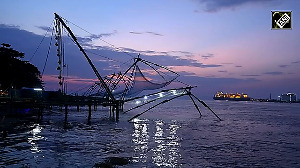All the three improvised explosive devices of low sophistication planted outside the Chinnaswamy stadium in Bengaluru where an IPL match was played on Saturday afternoon appear to have been planted in the open space outside the stadium after the anti-explosive sanitisation had been done thrice by the police. B Raman's take on the incident:
Two of the IEDs exploded before the match between the Mumbai Indians and the Royal Chellengers Bangalore was to start. According to some reports, they had been timed to explode after the start of the match, but both exploded prematurely.
These reports do not carry adequate conviction because when an IED is planted outside a stadium, it is timed to explode as the people are entering the stadium before the match to cause casualties and panic. The fact that all the IEDs were planted outside the stadium indicates that the perpetrators timed them to explode as the spectators were entering the stadium and not after they had entered. While two of the IEDs exploded near two of the entrances, the third failed to explode and was detected and defused.
It is likely that the IEDs were planted after the third anti-explosive sanitisation of the day had been completed. This indicates the possibility that the perpetrators mingled with the spectators outside before entering the stadium and evaded the police as they planted the IEDs.
The police appear to have been confident of the effectiveness of the sanitisation in the stadium. Moreover, all spectators entering the stadium had to pass through IED detectors at the gates.
The police were so confident that nobody would be able to smuggle in an IED that they allowed the match to go ahead after a delay of one hour during which they did another sanitisation.
Sanitisation inside an enclosed space like a hall or a room or even a stadium can be effective, but there are problems in maintaining the effective state of sanitisation in an open space outside a hall or a room or a stadium. The terrorists took advantage of this to plant the IEDs after the third sanitisation.
The need for a tighter watch on people outside the stadium after sanitisation has to be kept in view during the remaining IPL matches. This requires larger manpower and the government should make this available.
The two explosions injured 17 persons -- nine of them policemen. It would be unwise to presume that the perpetrators did not want to cause fatalities and wanted to cause only nervousness and panic. The low casualties could be attributed to the lack of powerful explosive material with the terrorists and their inadequate expertise in assembling them.
Locals belonging to the Indian Mujahideen ought to be the primary suspects. The IM had carried out serial explosions in Uttar Pradesh, Jaipur, Bengaluru, Ahmedabad and Delhi in 2007-08 and tried unsuccessfully to carry out explosions in Surat.
While the explosions were quite lethal in UP, Jaipur, Ahmedabad and Delhi, they were not that lethal in Bengaluru and Surat due to the inadequate expertise.
This indicates that the IM has trained experts in IEDs as well as untrained or inadequately trained perpetrators. Like the Bengaluru blasts of July 2008, those of Saturday would appear to have been carried out by inadequately trained perpetrators -- most probably locals.






 © 2025
© 2025